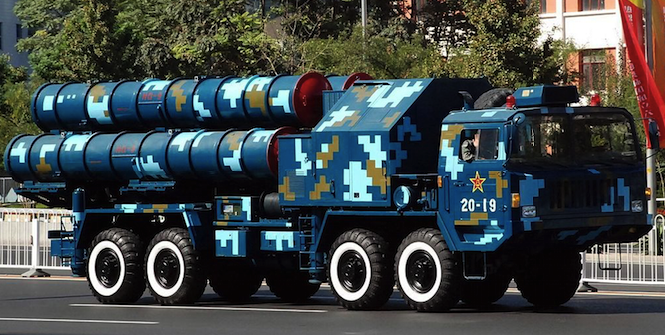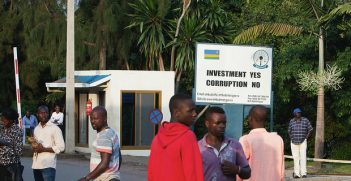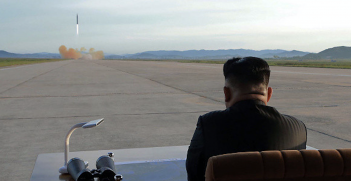Heading for Confrontation: China's Paracel Play

Credible reports are circulating that China has deployed an HQ-9 surface-to-air missile (SAM) system and an associated targeting radar to Woody Island, part of the Paracel group of islands in the South China Sea. Woody Island is approximately 400km off the Vietnamese coast (16°53′N 112°17′E) and to the South-east of China’s Hainan Island. In 2015 the Chinese undertook significant lengthening and strengthening of the Woody Island runway, now reported to be 2,920m in length and suitable for Chinese heavy lift military aircraft.
The HQ-9 SAM deployment was first reported by Fox News in the US, which has released commercial satellite imagery of before-and-after images of what’s claimed to be two batteries of eight SAM launchers and a supporting radar system deployed on a beach. Those details have been broadly confirmed both by the Taiwanese and US Defence Departments. The Pentagon has previously publicly claimed that the HQ-9 is a missile system based on the Russian SA-10, incorporating technology from advanced western systems and designed to counter ‘high-performance aircraft, cruise missiles, air-to-surface missiles (ASMs), and tactical ballistic missiles (TBMs)’ (PDF). The missile’s maximum range is reported to be 200km, carrying a warhead of 180kg.
For a number of critical reasons this is a strategic game changer for the Asia–Pacific region, and potentially for China–US relations. The HQ-9 deployment runs counter to assurancesPresident Xi provided to President Obama in Washington last September, and Chinese Foreign Minister Wang Yi repeated earlier this month to Secretary of State John Kerry on the South China Sea that ‘China has given a commitment of not engaging in so-called militarization, and we will honour that commitment’. The deployment also directly challenges a core US policy objective to prevent the further militarisation of the South China Sea, a goal that was endorsed at President Obama’s just-concluded ASEAN Special Leaders’ Summit at Sunnylands in California.
The ink on the Sunnylands’ declaration could hardly have been dry when the Fox News story broke. The summiteers reaffirmed ‘the key principles that will guide our cooperation going forward’, including:
Shared commitment to maintain peace, security and stability in the region, ensuring maritime security and safety, including the rights of freedom of navigation and overflight and other lawful uses of the seas, and unimpeded lawful maritime commerce as described in the 1982 UN Convention on the Law of the Sea (UNCLOS) as well as non-militarization and self-restraint in the conduct of activities.
The statement highlights the distinct incompatibility of China’s approach to South China Sea security with that pursued by the US and Southeast Asian nations.
Although Chinese Lanzhou-class destroyers carry the maritime version of the HQ-9, the deployment to Woody Island is the first permanent stationing of a highly capable SAM in the South China Sea. Such stationing shows a Chinese intent to match, and indeed exceed, any step by the US to assert overflight rights and to undertake Freedom of Navigation operations. The deployment raises the stakes throughout the entire region for any country looking to join the US in undertaking similar operations.
What are the implications of the HQ-9 going forward? First, the Chinese political claim that their islands and artificial facilities would not be militarised has been shown to be nothing more than an exercise in buying time for further military build-up in the South China Sea. Second, President Obama will surely be revising his estimate of the relationship he has with his Chinese counterpart. We are clearly nowhere near achieving a meeting of minds between the two leaders on security issues. A significant trust deficit will be hardening.
A third implication is that all countries over-flying the region will have to factor in the potentially greater risk that comes from the HQ-9 deployment. Its 200km range covers only a small part of the region, but the political intent is unmistakable. If China was prepared to deploy the SAM system to Woody Island it may well plan to locate HQ-9s on other islands in the region. A further Chinese step may be to announce an air defence identification zone over part of the South China Sea, presumably in the approaches to Hainan Island.
For countries in Southeast Asia, as well as Australia, Japan and any others concerned about China’s rapid physical assertion of sovereignty over the South China Sea, the HQ-9 deployment further raises the stakes. Backing down on the importance of freedom of navigation and overflight rights will damage our own credibility after vigorously asserting that such access is a critical strategic interest. Thus the terrain of incompatible strategic interests between China and its neighbours becomes starker, and the risks of miscalculation and potential conflict grow.
Peter Jennings is Executive Director of the Australian Strategic Policy Institute (ASPI). This article originally appeared on ASPI’s The Strategist on 18 February. It is republished with permission.




